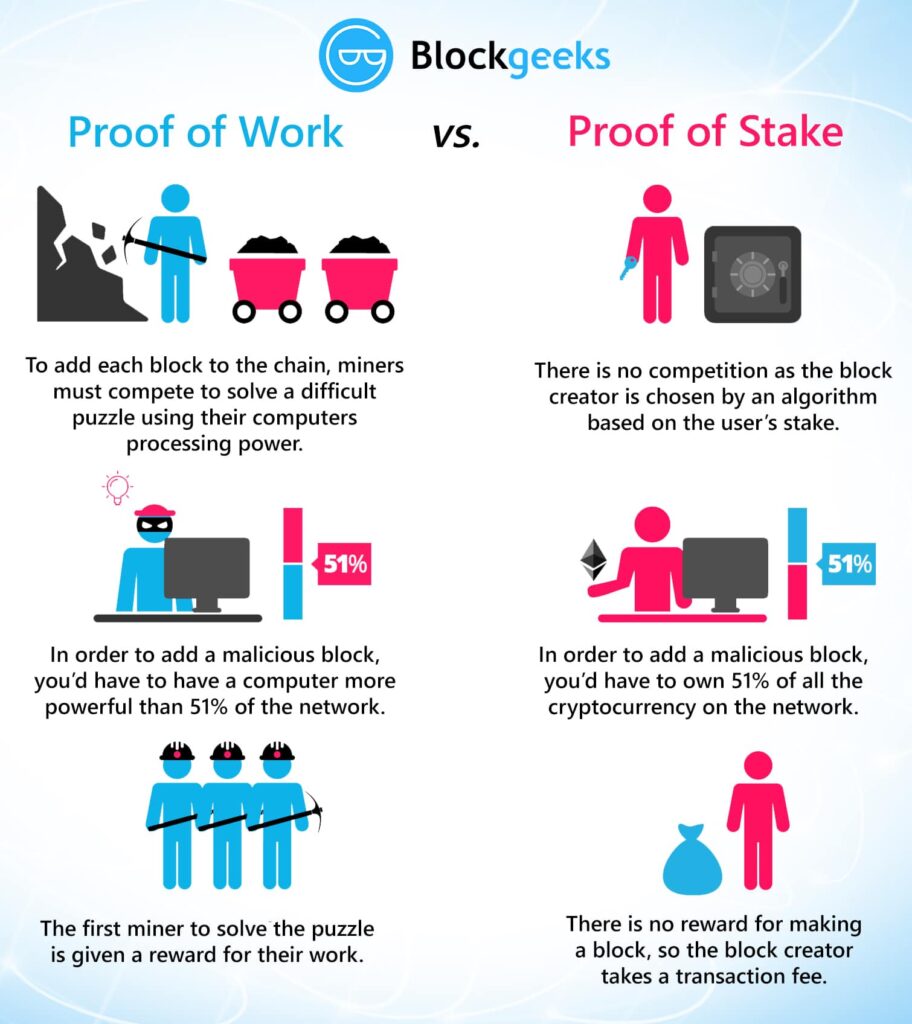
Whats the difference?
Proof of Work (PoW)?
*** Cryptocurrencies and NFTs are volatile and those who invest in them should be prepared to lose all their money. NOTHING www.howtopulse.com states, shares, expresses, or allude to should be considered financial advice or recommendations of action. This blog is intended for educational and entertainment purposes only. Consult a professional (or two…or more) for any tax, accounting or legal related questions you may have. Howtopulse did not receive any payments to write this blog or any other post on this site.***
Proof of work (PoW) is a decentralized consensus mechanism that requires members of a network to expend effort solving an arbitrary mathematical function to prevent anybody from gaming the system. PoW is used widely in cryptocurrency mining, for validating transactions and mining new tokens. Due to proof of work, Bitcoin, Ethereum and other cryptocurrency transactions can be processed peer-to-peer in a secure manner without the need for a trusted third party. This ultimately creates an inflationary system.
PoW at scale requires huge amounts of energy, which only increases as more miners join the network. This increase in miners and power consumption is becoming an issue with the “Green” world we are living in today. As energy consumption and energy prices go up, so do the fees to transact on the blockchain. One of the main reasons that it is so expensive to run a PoW system, is there is a great deal of computing power needed to validate transactions. In retrospect, PoW is inadvertently bad for the environment because the miners have to sell the profits they make in fees in order to pay for the consumed electricity.
Once transaction fees reach an unusable level, layer 2 solutions must be created to scale along with the ever growing blockchains. Layer 2 solutions allow relief on the system which helps lower the amount of transactions processed which lowers the fees associated with validating transactions.
Delegated Proof of Stake (DPoS)?
Delegated Proof of Stake (DPoS) is a consensus mechanism where users of the network vote (delegate) to a specific node (Validator) to validate the next block. Using DPoS, you can delegate by pooling your tokens into a staking pool and linking those to a particular Validator. You do not physically transfer your tokens to another wallet, but instead utilize a staking service provider to stake your tokens in a staking pool by the way of a smart contract. The smart contract is in your control at all times.
A limited number of Validators (in this case, 33) are chosen for each new block, so the delegates of one block might not be the delegates of the next. Elected Validators receive the transaction fees from the validated block, and that reward is then shared with users who pooled their tokens in the validator pool. The more you stake, the higher a share of the block reward you will receive. The rewards are shared based on each user’s stake; so if your stake represents 8% of the total staking balance, you would receive 8% of the block reward.
DPoW consensus network uses less energy therefore it is more environmentally friendly and sustainable than PoW. It also requires less 2nd layer solutions to solve the congestion issues that arise from mining on PoW consensus networks.
When it comes to then Pulse Chain specifically, 25-33% of the fees generated will get burned during each transaction on the block. This makes Pulse Chain a deflationary coin. Pulse Chain will start with a large total supply and will deplete over time.
NOTE: There is a risk of “slashing” that can occur. The rules have not yet been lined out for us but we will update this post once the slashing rules are posted. What we do know is that there are penalties, depending on the severity that can cause some sort of deduction in stake rewards.

